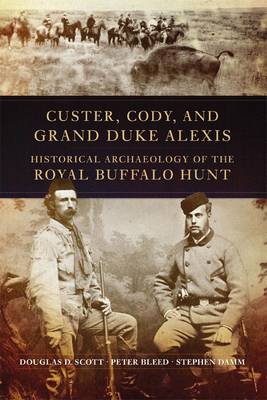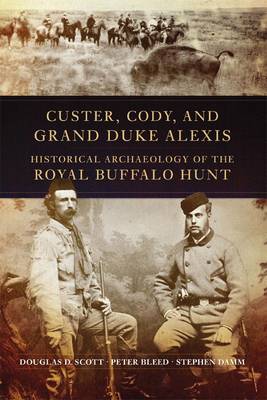
- Retrait gratuit dans votre magasin Club
- 7.000.000 titres dans notre catalogue
- Payer en toute sécurité
- Toujours un magasin près de chez vous
- Retrait gratuit dans votre magasin Club
- 7.000.0000 titres dans notre catalogue
- Payer en toute sécurité
- Toujours un magasin près de chez vous
Custer, Cody, and Grand Duke Alexis
Historical Archaeology of the Royal Buffalo Hunt
Douglas D Scott, Peter Bleed, Stephen Damm
Livre broché | Anglais
26,95 €
+ 53 points
Description
An innovative exploration of a legendary excursion on the western plains On a chilly January morning in 1872, a special visitor arrived by train in North Platte, Nebraska. Grand Duke Alexis of Russia had already seen the cities and sights of the East-New York, Washington, and Niagara Falls-and now the young nobleman was about to enjoy a western adventure: a grand buffalo hunt. His host would be General Philip Sheridan, and the excursion would include several of the West's most iconic characters: George Armstrong Custer, Buffalo Bill Cody, and Spotted Tale of the Brulé Sioux. The Royal Buffalo Hunt, as this event is now called, has become a staple of western lore. Yet incorrect information and misconceptions about the excursion have prevented a clear understanding of what really took place. In this fascinating book, Douglas D. Scott, Peter Bleed, and Stephen Damm combine archaeological and historical research to offer an expansive and accurate portrayal of this singular diplomatic event. The authors focus their investigation on the Red Willow Creek encampment site, now named Camp Alexis, the party's only stopping place along the hunt trail that can be located with certainty. In addition to physical artifacts, the authors examine a plethora of primary accounts-such as railroad timetables, invitations to balls and dinners, even sheet music commemorating the visit-to supplement the archaeological evidence. They also reference documents from the Russian State Archives previously unavailable to researchers, as well as recently discovered photographs that show the layout and organization of the camp. Weaving all these elements together, their account constitutes a valuable product of the interdisciplinary approach known as microhistory. Douglas D. Scott is Chief of the Rocky Mountain Research Division, Midwest Archeological Center, National Park Service. He holds B.A., M.A., and Ph.D. degrees from the University of Colorado and is widely known as an author, lecturer, and expert on military archaeology. Other books by Douglas D. Scott include Archaeological Insights Into the Custer Battle and They Died With Custer. Peter Bleed is Professor Emeritus of Anthropology at the University of Nebraska-Lincoln. Stephen Damm is a graduate student in anthropology at Western Michigan University, Kalamazoo.
Spécifications
Parties prenantes
- Auteur(s) :
- Editeur:
Contenu
- Nombre de pages :
- 228
- Langue:
- Anglais
Caractéristiques
- EAN:
- 9780806143477
- Date de parution :
- 29-03-13
- Format:
- Livre broché
- Format numérique:
- Trade paperback (VS)
- Dimensions :
- 152 mm x 226 mm
- Poids :
- 317 g

Les avis
Nous publions uniquement les avis qui respectent les conditions requises. Consultez nos conditions pour les avis.






